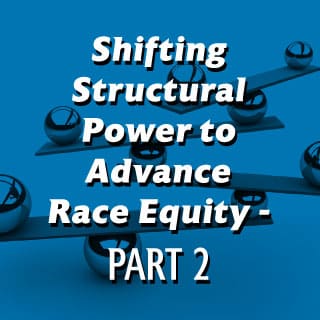As discussed in my previous blog post, the work of advancing race equity to achieve social and economic mobility is undeniably multifaceted and complex. It requires a long-term commitment to continuous and intentional learning, and there is no single way forward or a quick fix. However, there is a clear path for leaders seeking to accelerate the journey—we must simultaneously commit to shifting structural power. I concluded part 1 by sharing that in order to do so, we must also ask more questions. But where do we begin?
Let’s start by taking a hard look at how we, as public-sector leaders, show up in our communities. Is it only when we are procuring services or meeting a grant requirement that requires constituent input? Do we only take information in (e.g., via applications and community assessments) without returning the data to the community? Are the questionnaires and applications we use deficit based? None of these acts shifts the power structure—rather, they probably amplify it.
We need to consider what happens when leaders actively participate in community-led events they did not sponsor and the mindset shift that happens when leaders seek to understand community needs outside of a formal, government-sponsored process. What happens when human services leaders seek to understand the true assets of families and communities? What happens when we proactively share the administrative data we hold—in ways that are equitable and inclusive of community strengths? By personally attending community-led events, proactively seeking how we can support the priorities of the community, and using data as a learning tool, human services leaders can begin to shift structural power to the community and lay the groundwork for co-discovering what’s possible.
And I use that term co-discovery intentionally—it’s not just about co-creating solutions—it must start with mutual identification and understanding of root causes, using the co-discovery process itself as a tool for building trust with the community and then, together, redesigning a better way forward. It’s not a linear solution—it’s a social, relational, iterative, trust-building process that requires time and intentionality.
For a community to truly lead the way, system leaders must be prepared to build on what our partners at the Wellbeing Blueprint refer to as “social connections and social capital.” System leaders must adopt a mindset shift that recognizes “the value of institutions run by community members as the building blocks of change” and approach communities as assets “rather than problems to be solved.” For a compilation of insights from community-led efforts, check out Centering Equity in Collective Impact.
When community-led efforts collaborate with leaders from traditional sets of power in this way—the impact can be transformational. To achieve this kind of transformational change, public sector leaders must be prepared to grow individually while also equipping their teams with the knowledge and tools to know how power shows up in our daily work and structures, shifting the dynamics wherever we can. At APHSA, we will continue to serve as a platform for shared learning as we seek a greater understanding of how to advance race equity, including by shifting structural power to create systems that are truly human-centered and community-driven.
I’ll talk more about the importance of shifting systems to work with and for people and not the other way around in my next blog post. Until then, I hope to see you at our National Health and Human Services Summit June 12-15 in Arlington, VA, where we’ll continue to highlight community engagement that is truly human-centered, including during our closing general session that you won’t want to miss: Centering Community: The Journey Toward Healing, with Wellbeing Blueprint and Full Frame Initiative.
∎

